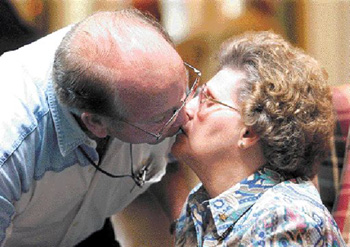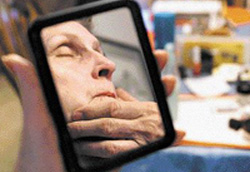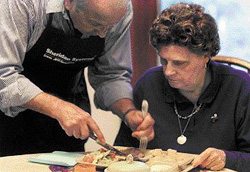One family's painful choice

|
Photos by Mame Burns
© 1999 Dayton Daily News|
HARRISON TWP. -- For nearly six years, Earnest Prather hadn't spent a single night away from his wife Beverly. How could he when she needed his help to eat, bathe and dress, to calm her through the long, restless nights?
Then, last July, at the urging of his children and his support group, he decided to take a 10-day vacation on his own. He placed Beverly in respite care at Karrington of Englewood and drove 700 miles to Lawrence, Kansas, to revisit the scene of happier times during the early years of their marriage.
 MAME BURNS/DAYTON DAILY NEWS
EARNEST PRATHER KISSES his wife Beverly as he drops her off at Sunrise Assisted Living of Englewood where she goes for adult day-care. While his wife used to reach for kisses 'a lot of times, she doesn't want to now,' Earnest says. Beverly has Alzheimer's disease and Earnest is her main caregiver.
MAME BURNS/DAYTON DAILY NEWS
EARNEST PRATHER KISSES his wife Beverly as he drops her off at Sunrise Assisted Living of Englewood where she goes for adult day-care. While his wife used to reach for kisses 'a lot of times, she doesn't want to now,' Earnest says. Beverly has Alzheimer's disease and Earnest is her main caregiver.
|
"I kept thinking about what she was thinking about -- about my not being there, waking up in different surroundings," the 69-year-old retired engineer said. "It's just those thoughts, as much as you try to keep them out of your mind, while you're driving."
It wasn't until several months ago, when he dropped his wife off one morning for adult day care and spied her across the lobby staring blankly into space, that Prather realized he was about to lose her to a disease from which there is no return. After 48 years of marriage, of raising three children, of sharing dreams, laughs, heartaches, travels and thousands upon thousands of days and nights together, Beverly was slipping inexorably into that twilight between life and death known as Alzheimer's.
Before her condition robbed her of much of her speech, "we used to talk about what would happen down the road a ways. We also used to talk about 'why.' With everything being so great in our lives, why? Why did this have to happen?" Prather put his fists to his mouth and stifled a sob. "If I could just read what's in her mind now . . ."
At age 66, Beverly Prather -- mother, grandmother, former real estate agent and avid country-western line dancer -- is nearing the last stages of Alzheimer's disease, a final turning point when patients lose the ability to recognize their loved ones, to control their bodily functions, even to swallow their own food.
Now her family, especially her husband Earnest, is grappling with what the next move will be for her long-term care. Home health aides? Assisted living? A nursing home? Expanded day care?
As experts strongly advise, the Prathers have started the search process early on, before it becomes a rushed decision under pressure of a crisis. In August, the Prathers and their three children gathered several times at the small ranch home Prather shares with his wife to discuss the future.
Earnest and Beverly Prather are part of a growing trend of "boomering parents" who have moved closer to their Baby Boomer children as their health declines.

|
Knowing that Alzheimer's disease can sometimes be hereditary, Hickman and her husband Philip have put aside savings for the family's future security. At the same time, Hickman said, she's confident that researchers are just a few years away from developing drugs that can stop the progress of Alzheimer's and, in a decade, they will have a cure for it. "What I have that my mother doesn't have is time, which is unfortunate," she said.
If they could afford it, the Prathers' first choice for Beverly would be assisted living care either at the new MapleRidge Marriott in Clayton or at Sunrise Assisted Living of Englewood, where she goes three times a week for a day-care program that helps keep her alert, and gives Earnest a much-needed break. "If she stayed home, she'd probably sit and watch TV all day," Hickman said. "This way she sees her friends, and they have games and activities for them."
Moving Beverly into Karrington full-time would be the easiest transition, the family says. They like the home-like setting at Sunrise, with its carpeting and drapes and plush Victorian decor, and its sunny, private rooms equipped with kitchenette and bath. They also like the way the staff involves residents in activities and social gatherings.
Like many assisted living facilities, Sunrise is determined to eradicate any resemblance to a nursing home. Its residential wings are dubbed "neighborhoods" rather than units. Each neighborhood has rooms for at least 12 residents and its own kitchenette, laundry, courtyard and living room with fireplace and library. Residents can dine in a restaurant-style setting with servers and linen tablecloths.
"It's just like moving to another home," Earnest Prather said.
The nursing homes the Prathers have looked at are neat and clean and have some homey touches, "but it's still like you're in a hospital. People are either in their rooms or they're sitting out in a hallway," Prather said. "You don't have all those little living rooms and all the activities. They pretty much end up staying in their rooms and they don't get involved."
But, like most Ohioans, finances have left the Prathers no choice but to place Beverly in a nursing home -- and not because it's cheaper. Beverly's care in a nursing home will cost twice as much: $4,500 to $5,000 a month, with no guarantee of a private room, compared to $2,200 to $2,300 per month for a private room at the MapleRidge Marriott.
The deciding factor for the Prathers is: The state's Medicaid program will pay for Beverly's nursing home care, but not for assisted living.
As a retired safety officer, Prather worked 15 years for the Occupational Safety and Health Administration. His modest government pension, together with Beverly's small Society Security benefit, are not enough to swing the cost of an assisted living facility.
 TOP, BEVERLY PRATHER holds a mirror as her husband Earnest applies her makeup and says, 'Look at the pretty girl.' Every day, Earnest does her hair and makeup. Earnest went to a cosmetics counter to learn how. BOTTOM, Earnest cuts up his wife's food for her. He says she eats more when he does this.
TOP, BEVERLY PRATHER holds a mirror as her husband Earnest applies her makeup and says, 'Look at the pretty girl.' Every day, Earnest does her hair and makeup. Earnest went to a cosmetics counter to learn how. BOTTOM, Earnest cuts up his wife's food for her. He says she eats more when he does this.